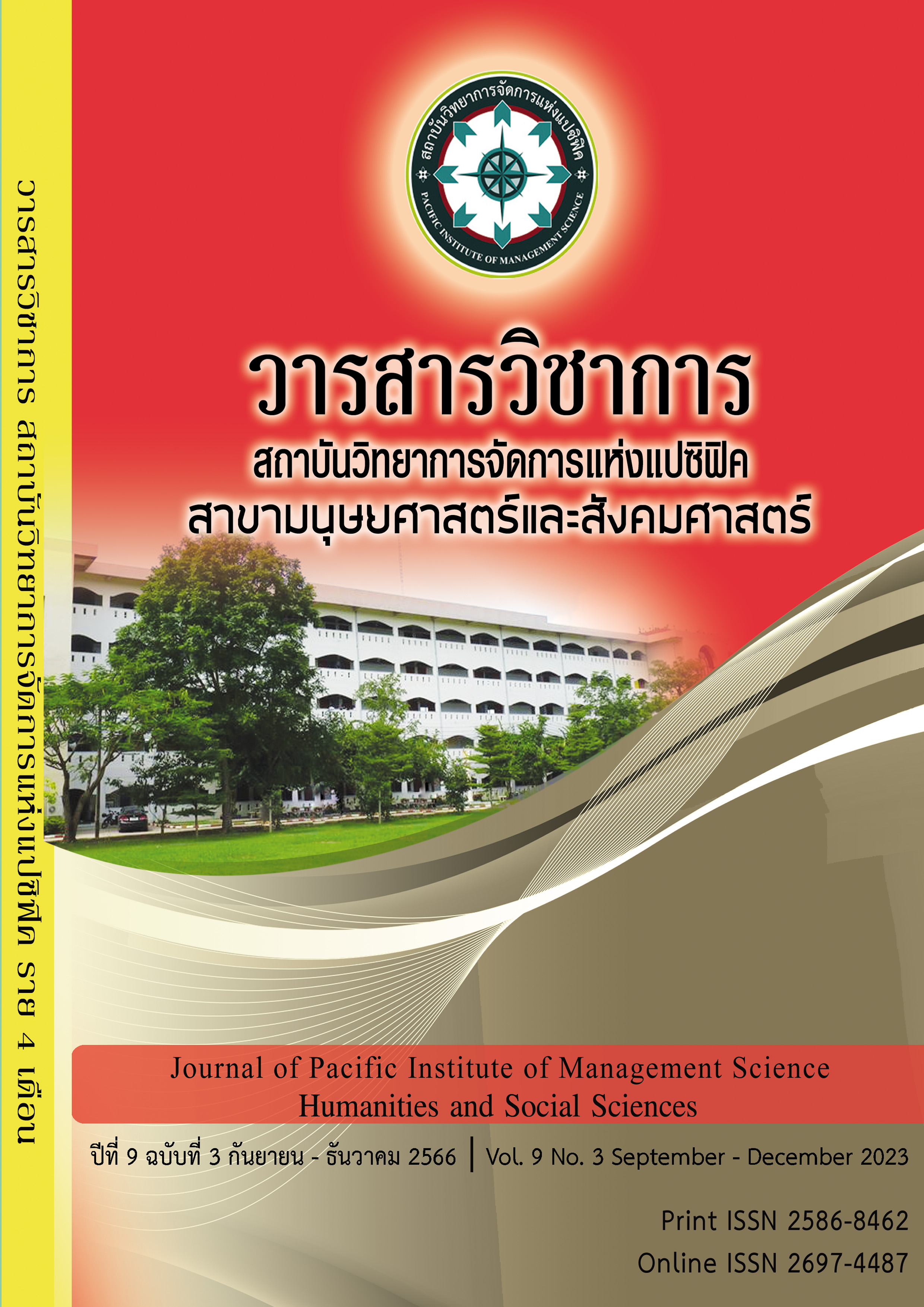The New Normal of Early Childhood Education Management In Primary School
Keywords:
New Normal, Early Childhood Education ManagementAbstract
The purpose of this research was to discover new normal of early childhood education management of primary school by applying the Ethnographic Delphi Future Research (EDFR) technique. The research used purposive sampling for selecting 21 experts. The instruments for collecting the data were Unstructured interviews and questionnaires. The statistics used for data analyzed were median, mode and interquartile range and content analysis.
The results revealed that: The new normal of early childhood education management in primary school consisted of 6 aspects as follows :
1) Policy formulation and planning : The schools must have flexible management that can be adjusted according to problems and contexts. There is unity and uniform measures. There is a systematic work placement and creates awareness for all stakeholders to understand and supervise. Follow up and evaluate the results to improve continuously.
2) Personnel management : The schools must develop personnel to have the potential to work according to their roles and responsibilities. Teachers have developed themselves to have expertise in producing media various forms of technology are ready to work anytime, anywhere. Build morale in work under safety measures, ready to provide experiences for children and create understanding for students, parents, families, communities, society in an appropriate way
3) Organize the environment to ensure the safety of hygiene : The schools should provide an environment learning resources taking into account safety and contributing to the development of children An incident response plan is prepared and forwarded. Supporting or provisioning materials and providing or creating innovation or a platform to create an environment conducive to learn.
4) Participation of family and community : The schools should invite officials, parents, and communities to participate in networking to help schools and participate in developing children's potential in learning at home. Be a teacher to help organize experiences for children at home to participate in tracking progress, exchanging ideas on child development with teachers.
5) Curriculum design and experience management : Optimize the course with the situation based on principles and designing the experience according to the curriculum standards and arranging a schedule suitable for the situation according to the availability and differences of each family. Communicate with parents using the form of PLC process through an online channel system to exchange knowledge and find solutions to improve and develop.
6) Promoting all-round development : The teachers must analyze the development of the child if there is any deficiency or completeness before completing the child. Analyze developmental assessment forms and design experiences for children to develop in all aspects. Providing/producing video clips or set boxes with easy-to-use descriptions to send to parents to study for activities. Teachers create activities to promote development in a variety of formats.
References
กิติชัย วงศ์ศิลปะกุลและประเสริฐ อินทร์รักษ์.(2564). การบริหารการจัดประสบการเรียนรู้ตามหลักสูตรการศึกษาปฐมวัย พ.ศ.2560 ของโรงเรียนสังกัดกรุงเทพมหานคร.” วารสารศิลปะการจัดการ 5, 3 (กันยายน – ธันวาคม 2564): บทคัดย่อ.
กุลลิยา ตันติพาลาจิวา. (2551). รูปแบบการสอนเด็กปฐมวัย. กรุงเทพฯ: อดิสรเพรสโพรดักซ์, 2551.คณะกรรมการพัฒนาเด็กปฐมวัยแห่งชาติ. มาตรฐานสถานพัฒนาเด็กปฐมวัยแห่งชาติ, (ม.ป.ท.: 2562): 2-14.
ปีเตอร์ ฟิสก์. Megatrends 2020-2030 สิ่งที่มีความหมายต่อคุณธุรกิจและการเติบโตของนวัตกรรม. เข้าถึงเมื่อ 24 เมษายน 2564 เข้าถึงได้จาก https://www.nstda.or.th/home/knowledge_post/megatrend-2020-2030/
เพชรดาว นิลสว่าง, พรเทพ เสถียรนพเก้า และเอกลักษณ์ เพียสา.(2564). การบริหารการจัดการศึกษาปฐมวัยที่มีประสิทธิผลสำหรับโรงเรียนประถมศึกษา สังกัดสำนักงานคณะกรรมการการศึกษาขั้นพื้นฐานในภาคตะวันออกเฉียงเหนือ.” วารสารวิชาการธรรมทรรศน์ 22,4 (ตุลาคม – ธันวาคม 2565): บทคัดย่อ.
วัยวุฒิ บุญลอย. ได้ศึกษานิวนอร์มัลในการพัฒนาเด็กตามพระราชบัญญัติการพัฒนาเด็กปฐมวัย พ.ศ. 2562.” วารสารจันทรเกษมสาร 27, 1 (มกราคม -มิถุนายน 2564): บทคัดย่อ.
ศิริมงคล ทนทองและศศิรดา แพงไทย. “รูปแบบการจัดการศึกษาปฐมวัยยุคการศึกษา 4.0 ของสถานศึกษา สังกัดสำนักงานคณะกรรมการการศึกษาขั้นพื้นฐาน,” วารสารบัณฑิตศึกษามหาจุฬาขอนแก่น 6, 3 (กรกฎาคม – กันยายน 2562): บทคัดย่อ.
สุปรีดา อดุลยานนท์. “ชีวิตวิถีใหม่คนไทยเมื่อต้องอยู่กับโควิดแบบมาราธอน,” มติชนรายวัน (6 มกราคม 2564 2564): 20.
สำนักงานกองทุนเพื่อความเสมอภาคทางการศึกษา. ทุนชีวิตเด็กปฐมวัย การลงทุนที่ไม่มีวันขาดทุน. เข้าถึงเมื่อ 28 มีนาคม 2565 เข้าถึงได้จาก https://www.eef.or.th/invest-in-early-childhood-development/
Macmillan. “The Delphi Technique” (Paper Presented at the annual meeting of the California Junior Colleges Associations Committee on Research and Development Monterey, Calif., (May 3-5, 1971).
Downloads
Published
Issue
Section
License
Copyright (c) 2023 Pacific Institute of Management Science

This work is licensed under a Creative Commons Attribution-NonCommercial-NoDerivatives 4.0 International License.
บทความที่ได้รับการตีพิมพ์เป็นลิขสิทธิ์ของ สถาบันวิทยาการจัดการแห่งแปซิฟิค
ข้อความที่ปรากฏในบทความแต่ละเรื่องในวารสารวิชาการเล่มนี้เป็นความคิดเห็นส่วนตัวของผู้เขียนแต่ละท่านไม่เกี่ยวข้องกับสถาบันวิทยาการจัดการแห่งแปซิฟิค และคณาจารย์ท่านอื่นๆในสถาบันฯ แต่อย่างใด ความรับผิดชอบองค์ประกอบทั้งหมดของบทความแต่ละเรื่องเป็นของผู้เขียนแต่ละท่าน หากมีความผิดพลาดใดๆ ผู้เขียนแต่ละท่านจะรับผิดชอบบทความของตนเองแต่ผู้เดียว







